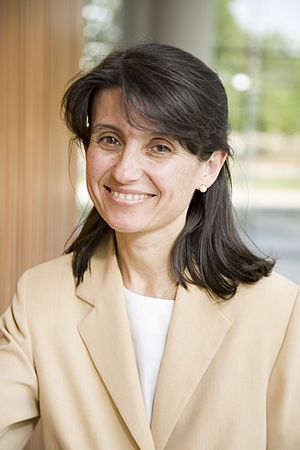Ana Maria Cuervo facts for kids
Quick facts for kids
Ana Maria Cuervo
|
|
|---|---|

Ana Maria Cuervo in 2008
|
|
| Born | July 14, 1966 |
| Nationality | Spanish and American |
| Occupation | Scientist, cell biologist |
| Known for | Chaperone-mediated autophagy research |
Ana Maria Cuervo was born on July 14, 1966. She is a scientist from both Spain and America. She is a doctor, a researcher, and a cell biologist. Dr. Cuervo teaches at the Albert Einstein College of Medicine. She also helps lead the Institute for Aging Studies there. She is famous for her work on something called autophagy. This is how cells clean themselves by recycling old or damaged parts. Dr. Cuervo studies how this process changes as people get older and in diseases related to aging.
Contents
About Ana Maria Cuervo
Early Life and Education
Ana Maria Cuervo was born in Barcelona, Spain, on July 14, 1966. She went to the University of Valencia to study medicine in 1986. After that, she earned a PhD in biochemistry and molecular biology. Her mentor was Erwin Knecht, a scientist who studied cell parts called lysosomes.
In 1993, Dr. Cuervo helped write her first scientific paper. This paper talked about how lysosomes break down waste in cells. It showed that this process was more specific than people thought.
Discovering Chaperone-Mediated Autophagy
During summers, when labs in Spain were closed, Dr. Cuervo worked with Fred “Paulo” Dice. He was a scientist at Tufts University in the United States. She later joined his lab full-time to learn more about how lysosomes work.
In 1996 and 2000, Dr. Cuervo and Dr. Dice shared their important discoveries. They found a special way cells clean themselves. They identified a protein called LAMP2A that helps this process. They named this new way of cell cleaning "chaperone-mediated autophagy".
Research at Albert Einstein College of Medicine
In October 2001, Dr. Cuervo became a professor in New York. She joined the Albert Einstein College of Medicine in The Bronx. There, she continued to study chaperone-mediated autophagy. She focused on how it affects aging and human diseases.
Her research team looks at how proteins move into lysosomes. They have found other proteins that help control this process. Dr. Cuervo also worked with neuroscientist David Sulzer. They found that chaperone-mediated autophagy changes in people with Parkinson's disease. They also saw similar problems in people with Huntington Disease. Her team also discovered that a protein called LRRK2, which can be faulty in Parkinson's disease, messes up this cleaning process.
Leadership and Recognition
Dr. Cuervo is a leader at the Einstein Institute for Aging Research. She is also part of the Einstein Liver Research Center and Cancer Center. She holds a special position called the Robert and Renée Belfer Chair for the Study of Neurodegenerative Diseases. These are diseases that affect the brain and nerves.
She has been chosen as a member of important science groups. In 2015, she became an International Academic of the Royal Academy of Medicine of the Valencia Community. In 2017, she joined the Real Academia de Ciencias Exactas, Físicas y Naturales. In 2018, she became a member of the American Academy of Arts and Sciences. In 2019, she was elected to the National Academy of Sciences.
Dr. Cuervo has also helped guide national science efforts. She was on councils for the National Institute on Aging (NIA) and the NIH. She is also one of the people who started the Women in Autophagy (WIA) network. This group helps young women scientists who are interested in autophagy.
She helps edit the scientific journal Aging Cell. She also works on the editorial boards for Cell Metabolism and Molecular Cell. Dr. Cuervo has written or helped write over 200 scientific papers. She has been named a Highly Cited Researcher multiple times, meaning her work is often used by other scientists.
Awards and Honors
Dr. Cuervo and her team have received many awards for their work. Some of these include the P. Benson Award, the Nathan Shock Memorial Award, and the Vincent Cristofalo Award in Aging. She has also given many important talks, like the Robert R. Konh Lecture and the NIH Director’s Lecture. She has twice received the LaDonne Schulman Teaching Award for her teaching skills.
Personal Life
Dr. Cuervo speaks both Spanish and English. Her husband is Dr. Fernando Macian. He is also a scientist, an immunologist, at the Albert Einstein College of Medicine.
See also
 In Spanish: Ana María Cuervo para niños
In Spanish: Ana María Cuervo para niños

